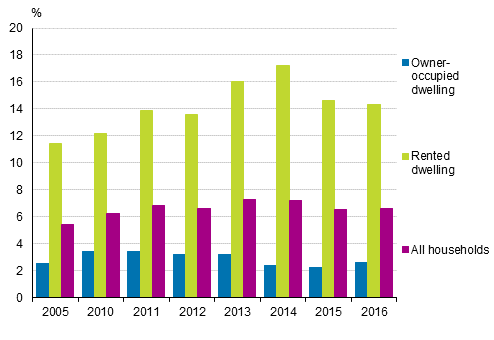Published: 28 March 2018
Burdening by housing costs almost unchanged
High housing costs burdened 6.6. per cent of households in 2016. The share was 14.3 per cent for households living in rented dwellings. The share of households burdened by housing costs already decreased in the year before. These data derive from Statistics Finland’s income distribution statistics .
Households burdened by housing costs by form of tenure of the dwelling in 2005, 2010 to 2016, %

The share of the housing costs of the disposable income, excluding housing benefits of a household burdened by housing costs 1) is over 40 per cent. Housing benefits are not included in housing costs or disposable money income (see concepts and definitions of the income distribution statistics ).
Share of households burdened by housing costs remained almost unchanged. In 2016, there were 176,100 such households, which is 6.6 per cent of all households. In total, 223,400 persons belonged to these households, or 4.1 per cent of the entire population.
Altogether, 14.3 per cent of households living in rented dwellings and around three per cent of households living in owner-occupied dwellings were burdened by housing costs in 2016. For households living in rented dwellings the share was nearly three percentage points lower than in 2014 just like in 2015. The income development of households living in rented dwellings has been more favourable than earlier since 2014.
The average income share of housing costs, measured as a median, remained at close on 15 per cent for households in total in 2015 to 2016 and almost 11 per cent for households living in owner-occupied dwellings. For households living in rented dwellings the income share of housing costs’ median was 25.9 per cent in 2016. It was around one percentage lower than in 2014.
According to the statistical definition, some 22.2 per cent of households at-risk-of-poverty 2) and fewer than four per cent of households with higher income levels are burdened by housing costs. Among households at-risk-of-poverty, the income level of households living in rented dwellings was lower and the housing costs were higher than for households living in owner-occupied dwellings. Altogether, 29 per cent of households at-risk-of-poverty living in rented dwellings and 12 per cent of households living in owner-occupied dwellings were burdened by housing costs in 2016.
The income share of housing costs of households at-risk-of-poverty were, on average, 28.5 per cent measured by the median for those living in rented dwellings and close on 20 per cent for households living in owner-occupied dwellings. The combined income share of housing costs and running capital expenses of the dwelling was, on average, over 23 per cent for households at-risk-of-poverty living in owner-occupied dwellings.
1) The definition is based on Eurostat, the Statistical Office of the European Union’s EU-SILC, Statistics on Income and Living Conditions. In Eurostat’s statistical compilation, the statistical unit is a person not a household.
2) Households at-risk-of-poverty refer to households and their members where the disposable money income per consumption unit among the population, i.e. the equivalent disposable money income, is below 60 per cent of the national income. In 2016, the households whose equivalent disposable money income was under EUR 14.430 were classified as at-risk-of-poverty. The consumption units are based on the so-called OECD’s modified scale. One adult in the household is one consumption unit. Other persons in the household aged at least 14 each are 0.5 consumption units and children aged 0 to 13 each are 0.3 consumption units. A household with one adult member is one consumption unit, while a household consisting of spouses and one child aged under 14 together are 1.8 consumption units.
Source: Income distribution statistics 2016, Statistics Finland
Inquiries: Marie Reijo 029 551 2547
Director in charge: Jari Tarkoma
Publication in pdf-format (348.4 kB)
- Tables
-
Tables in databases
Pick the data you need into tables, view the data as graphs, or download the data for your use.
- Quality descriptions
-
- Quality report: Income Distribution Statistics (28.3.2018)
Updated 28.03.2018
Official Statistics of Finland (OSF):
Income distribution statistics [e-publication].
ISSN=1799-1331. Income, housing and housing expenditure 2016. Helsinki: Statistics Finland [referred: 22.2.2026].
Access method: http://stat.fi/til/tjt/2016/03/tjt_2016_03_2018-03-28_tie_001_en.html

